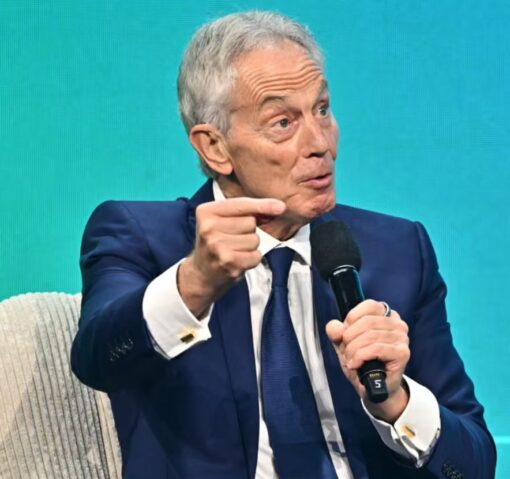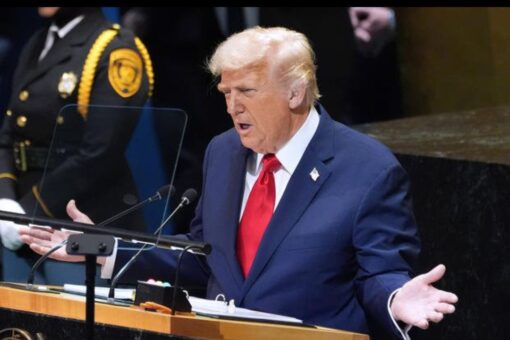The White House has quietly thrown its weight behind a plan that would see former British prime minister Tony Blair return to the political stage in one of the world’s most combustible regions, taking the reins of a proposed Gaza transition authority that could govern the territory for up to five years.
The initiative, according to senior officials, is designed to provide international oversight of Gaza’s postwar reconstruction and political stabilization. But the very prospect of Blair’s appointment has already triggered heated debate among Palestinians, Arab leaders, and international diplomats who question both the legitimacy and the long-term consequences of such an arrangement.
At the center of the proposal is the creation of the Gaza transition authority, formally envisioned as the Gaza International Transitional Authority (GITA).
Structured as a multinational administration modeled loosely on the systems once used in Kosovo and Timor-Leste, it would serve as Gaza’s supreme political and legal power during a temporary mandate.

According to reports, GITA would initially be headquartered in Egypt’s northern Sinai city of El-Arish before moving into the Strip, accompanied by a UN-endorsed multinational peacekeeping force with significant Arab participation.
The goal, officials say, is to establish stability while paving the way for eventual unification of all Palestinian territory under a reformed Palestinian Authority.
Former prime minister Blair, whose tenure as Middle East envoy between 2007 and 2015 left him with connections across Gulf capitals but a toxic reputation among many Palestinians, would be appointed as the figurehead and chief coordinator of this authority.
He would oversee a secretariat of up to twenty-five international advisers and chair a board that would direct an executive body responsible for humanitarian relief, reconstruction, and security.
For supporters in Washington, Blair is viewed as an experienced statesman capable of navigating fractious regional politics. Critics, however, argue that his deep association with the 2003 Iraq war and years of stalemated diplomacy make him an unacceptable custodian of Palestinian hopes.
“This is not about occupation; it is about stability,” a senior White House official told reporters on background. “We believe Mr. Blair has the credibility with Arab states, Israel, and Western powers to shepherd Gaza through the most difficult transitional period in its history.”
The official added that President Donald Trump had presented the broad outlines of the plan during a high-level meeting in New York this week with leaders from Qatar, Saudi Arabia, Jordan, Turkey, and Indonesia, all of whom were urged to lend support to the multinational effort.
Yet even as Trump described the talks as “close to getting some kind of deal done,” skepticism was immediate.
Palestinian Authority president Mahmoud Abbas, addressing the UN General Assembly by video link after being denied a US visa, reiterated that Gaza was “an integral part of the state of Palestine” and that his administration was “ready to bear full responsibility for governance and security there.” He added sharply: “We cannot accept an arrangement that bypasses the Palestinian people’s right to self-determination, nor one that installs a foreign leader over our homeland.”
Abbas’s remarks reflected a wider unease among Palestinians. Civil society groups in Gaza and the West Bank recalled Blair’s tenure as Quartet envoy, where he was often accused of prioritizing Israeli security concerns over Palestinian sovereignty.
For many in the region, his support for the Iraq invasion remains a scar that discredits his moral authority. “This is like asking the arsonist to manage the fire brigade,” one Palestinian academic said bitterly. “He speaks of peace while standing on the ashes of wars he helped ignite.”
Arab governments have also voiced reservations. Diplomats from Egypt and Jordan, while welcoming the idea of international assistance in stabilizing Gaza, warned that any transitional arrangement must include a clear timeline toward Palestinian elections and the restoration of self-rule.
Saudi Arabia’s foreign minister, Prince Faisal bin Farhan, emphasized in New York that Arab states would only support a peacekeeping deployment if it was linked to “a credible political horizon leading directly to statehood.”
In private, officials suggested that the White House plan, by leaving the duration of Blair’s mandate open-ended, risked creating the perception of a new occupation under international guise.
For Israel’s government, however, the proposal appears reassuring. Prime Minister Benjamin Netanyahu has long opposed the immediate handover of Gaza to the Palestinian Authority, citing fears of Hamas infiltration and instability.
Blair’s leadership, with Western backing and Arab participation, offers Jerusalem a degree of comfort that security concerns will be prioritized. As one Israeli official put it, “Blair is someone we can work with. He understands the realities of terrorism and the necessity of tough measures.”
That very sentiment, however, reinforces Palestinian fears that the Gaza transition authority may tilt toward enforcing order rather than enabling sovereignty.
The controversy is sharpened by the existence of a rival blueprint already endorsed by the UN General Assembly earlier this month. Known as the New York Declaration, that plan envisages a one-year technocratic administration followed by elections and a swift transfer of power to a reconstituted Palestinian Authority.
More than 140 countries have backed the resolution, which many Arab states regard as the clearest path to Palestinian self-determination. By contrast, the White House plan’s ambiguity about timing is seen as a deliberate hedge designed to accommodate Israeli preferences.
French president Emmanuel Macron has been working feverishly to reconcile the two approaches, but diplomats concede the gap may be too wide.
The shadow of Trump’s earlier proposals also looms large. Earlier this year he floated the idea of the United States and Israel jointly administering Gaza, with language about “cleaning out” the population that provoked accusations of endorsing ethnic cleansing.
The new plan, by contrast, explicitly rules out forced displacement of Palestinians. A “property rights preservation unit” would even be established to safeguard land ownership and the right of return for those who temporarily leave during reconstruction.
But for many observers, the damage has been done. “You cannot erase the memory of those words,” said a European diplomat. “Even if this plan is more moderate, it will be judged against what came before.”
Blair himself has remained silent on the reports, though allies note he has maintained close ties with Gulf leaders and has repeatedly argued that economic development and security cooperation are essential foundations for peace.
His supporters claim that his ability to engage Arab monarchs, Western capitals, and Israel simultaneously makes him uniquely suited for such a role. Yet within Palestinian discourse, his name is synonymous with obstruction and foreign interference.
Social media in Gaza lit up with derision as the reports spread, with one commentator writing: “We are not a colony in need of a governor.”
As the debate intensifies, the real question may be whether the Gaza transition authority can secure broad enough legitimacy to function effectively. Without Palestinian buy-in, even the most elaborate international designs risk collapse.
Humanitarian organizations have already voiced concern that the plan gives too much control to a central executive body while sidelining local actors. “If the people of Gaza do not see themselves represented, no authority will be sustainable,” warned a senior UN official.

Still, Washington appears determined to push ahead. For Trump, the Blair plan represents a middle ground between his earlier maximalist vision and the UN’s more accelerated timeline.
“I will not allow Israel to annex the West Bank. Nope. I won’t allow it. It’s not going to happen,” he told reporters at the White House, framing himself as a guarantor of Palestinian territorial integrity even as critics accused him of imposing foreign stewardship. With US elections looming, the administration is eager to showcase progress on Middle East peace, however fragile or contested.
Whether Tony Blair ultimately accepts the role may depend on calculations far beyond Gaza. For the former prime minister, it would mark an extraordinary return to frontline diplomacy after years of criticism and political exile.
For Palestinians, it would feel like history repeating itself, with their fate decided by external powers and implemented by figures they neither trust nor want. And for the region, the establishment of a Gaza transition authority could either be a stepping stone to statehood or yet another detour on a road that has already stretched across generations.
In the coming weeks, envoys will shuttle between capitals, negotiators will draft communiqués, and leaders will weigh the risks of embracing or rejecting the plan.
But beneath the diplomatic maneuvering lies a simple truth: Gaza’s people remain weary, wounded, and yearning for self-rule. Whether under Blair’s stewardship, a UN technocracy, or a reformed Palestinian Authority, their demand is the same as it has been for decades — the right to live freely in their own land.
Secondary keyphrases: Tony Blair Gaza, Palestinian statehood plan, transitional Gaza authority


